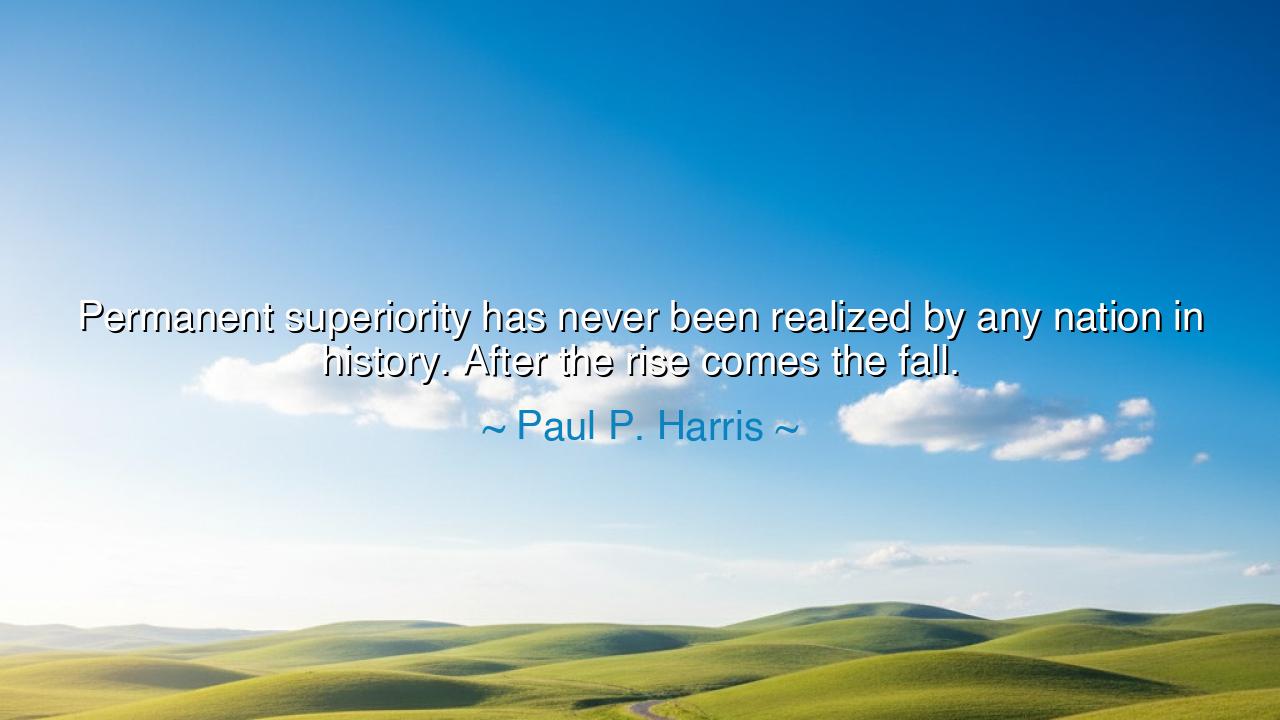
Permanent superiority has never been realized by any nation in
Permanent superiority has never been realized by any nation in history. After the rise comes the fall.






“Permanent superiority has never been realized by any nation in history. After the rise comes the fall.” Thus spoke Paul P. Harris, the founder of Rotary International, a man who saw not only the outer workings of society but the eternal cycles that shape the fate of all human endeavor. In this statement, he touches upon one of the oldest truths known to humankind — that no empire, no kingdom, no civilization, however mighty, stands unchanging beneath the heavens. The wheel of time turns for all; power, like the tide, advances and withdraws. Those who believe themselves invincible soon discover the humility that history demands of all who rise too high.
In his reflection, Harris reminds us that superiority, whether of nations, leaders, or individuals, is never permanent — for it defies the law of balance that governs the universe. The stars themselves are born, blaze in splendor, and then fade into darkness. How, then, could mortal powers hope to endure forever? The forces that lift a nation — courage, innovation, unity — can also wither into arrogance, greed, and division. Thus, the same flame that lights the ascent can burn the foundation on which it stands. Harris saw this truth not as a curse, but as a warning: to remember humility even in greatness, and vigilance even in peace.
Throughout the ages, this law has been written in the rise and fall of civilizations. Consider Rome, that mighty heart of empire whose legions once marched across the known world. For centuries it seemed eternal, its laws and language spreading like light through the dark. Yet, as its borders expanded, its spirit began to decay. Power bred complacency, wealth bred corruption, and pride blinded it to its own weakness. When the barbarians came, Rome did not fall in a single night — it had been falling for generations, eroded from within. So too did Egypt, Greece, and Persia, each believing their greatness was unassailable, each brought low by the turning of the ages. The truth Harris spoke was carved in their ruins long before he gave it voice.
Even in more recent centuries, this pattern endures. Britain, whose empire once stretched across the seas, proclaiming that the sun never set upon its dominion, saw that sun dip at last below the horizon. The Ottoman Empire, the Mongol horde, the Spanish crown — all rose on the wings of ambition, only to fall beneath the weight of their own triumphs. These stories are not tales of failure, but of transformation. Each fall gives way to renewal, each end to a new beginning. For history, like the seasons, must cycle between growth and decay, lest the world stagnate. Thus, Harris speaks to the rhythm of existence itself — the eternal rise and fall that ensures life’s movement and balance.
And yet, his words carry more than a lesson for nations; they echo within the soul of every person. For the same forces that shape empires dwell within the human heart. We, too, rise and fall in our lives — in our fortunes, our pride, our wisdom. The man who believes himself beyond failure courts his downfall, while the one who learns humility in success builds endurance that outlasts circumstance. Pride, when unchecked, blinds us to the cracks in our foundation; gratitude, when practiced, fortifies the spirit against the inevitable change. As with nations, so with souls: after every ascent must come a descent, but the wise use that descent not as ruin, but as renewal.
Harris’s insight was born in an age of great change — the early twentieth century — when industrial powers were expanding, empires colliding, and the illusion of permanence seemed stronger than ever. Yet he saw through the glitter of progress to the truth beneath it. His words are not a condemnation of ambition, but a call to balance. He does not say that nations should not rise, but that they should rise wisely — with awareness of their place in the cycle of time, and with respect for those who came before. To build without humility is to invite destruction; to lead without compassion is to sow the seeds of decline.
So, my child of the modern age, take this teaching to heart. Do not mistake strength for eternity, nor success for invincibility. Whether in nations or in the quiet empire of your own life, remember that every height is but a breath away from the fall. Therefore, walk with grace in victory and with courage in loss. Build not only for glory, but for legacy — one founded on wisdom, kindness, and the service of others. For though all things rise and fall, the spirit that acts in harmony with truth endures beyond the reach of time. That is the lesson of history, and the wisdom of Paul P. Harris: to rise with humility, and to fall with honor.






AAdministratorAdministrator
Welcome, honored guests. Please leave a comment, we will respond soon